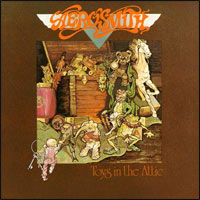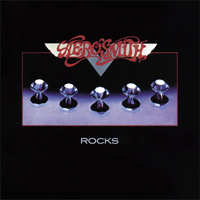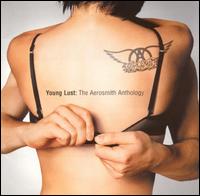|
Music Reviews
Alternative
Blues
Books
Christmas
Classic Rock
Country
Jazz
Lounge
Oldies
Power Pop
Punk & New Wave
Reggae
Rhythm & Blues
Seventies
Texas
Special Features
Randy's Rodeo
Sex Pistols
Motown
Halloween
Valentine's Day
Information
About Me
Feedback
Links
User's Guide
Support Me
Amazon
iTunes
Sheet Music Plus
|
Sock it to me, Santa! Visit my other website, www.hipchristmas.com Visit my other website, www.hipchristmas.com
 People
forget that heavy metal began as an entirely blues-based form of music. At its genesis
in the late 60's, heavy metal was essentially the blues played very, very loudly
(cf. Cream, Vanilla Fudge, and especially Led Zeppelin). These early metal bands
had taken their cue largely from the Rolling Stones, Animals, and other British blues
bands who, in turn, had drawn their inspiration directly from the source - Howling
Wolf, Muddy Waters, and the like. In the 70's, Aerosmith followed
in Led Zeppelin's footsteps, and subsequently, the bands of the 80's heavy metal
renaissance (epitomized by Guns 'N Roses) were created entirely in Aerosmith's image. People
forget that heavy metal began as an entirely blues-based form of music. At its genesis
in the late 60's, heavy metal was essentially the blues played very, very loudly
(cf. Cream, Vanilla Fudge, and especially Led Zeppelin). These early metal bands
had taken their cue largely from the Rolling Stones, Animals, and other British blues
bands who, in turn, had drawn their inspiration directly from the source - Howling
Wolf, Muddy Waters, and the like. In the 70's, Aerosmith followed
in Led Zeppelin's footsteps, and subsequently, the bands of the 80's heavy metal
renaissance (epitomized by Guns 'N Roses) were created entirely in Aerosmith's image.
The strutting lead singers, the bad boy guitarists, the ballsy rockers seasoned
with power ballads - that was pure Aerosmith, and their influence cannot be overstated.
The problem was that, over time, rock's heavy metal heroes had grown farther and
farther away from the rosetta stone of metal: the blues. In the process, heavy metal
grew more and more self-referential. Like a bunch of inbred hillbillies, the results
generally became less viable with each successive generation. By the late 80's, heavy
metal sucked big eggs (still does) and had absolutely nothing to do with the blues
(still doesn't).
 All
the same, Aerosmith - how great were they in their heyday? Hell, they're not bad
right now, and they're like, what, a hundred years old? They may have started off
as a working class Led Zeppelin/Rolling Stones clone (albeit a pretty good one)
but by their third album, Toys
In The Attic, they were firing on all cylinders and burning up the track. Toys is
simply a drop-dead rock classic, a winner from start to finish. Best known for
the singles "Sweet Emotion" and "Walk This Way," the non-single
tracks are consistently killer (especially "Adam's Apple," "Round
And Round," and "No More No More"). And, given the discussion above,
it's gratifying to see the boys give props to their forebears: witness their spirited
cover of Bull Moose Jackson's double entendre classic "Big Ten Inch Record." All
the same, Aerosmith - how great were they in their heyday? Hell, they're not bad
right now, and they're like, what, a hundred years old? They may have started off
as a working class Led Zeppelin/Rolling Stones clone (albeit a pretty good one)
but by their third album, Toys
In The Attic, they were firing on all cylinders and burning up the track. Toys is
simply a drop-dead rock classic, a winner from start to finish. Best known for
the singles "Sweet Emotion" and "Walk This Way," the non-single
tracks are consistently killer (especially "Adam's Apple," "Round
And Round," and "No More No More"). And, given the discussion above,
it's gratifying to see the boys give props to their forebears: witness their spirited
cover of Bull Moose Jackson's double entendre classic "Big Ten Inch Record."
Aerosmith came together in 1970 in New Hampshire, and they quickly migrated to
Boston. Their focal point and creative core were strutting vocalist Stephen Tyler
(a Mick Jagger look-alike with attitude to spare) and scowling ax man Joe Perry.
The rest of the band consisted of guitarist Brad Whitford, bassist Tom Hamilton,
and drummer Joey Kramer. It is these five men who made Aerosmith's best records
(both early and late in their career), and in short order they became one of the
best hard rock outfits ever to grace a stage.
Their 1973 self-titled
debut (featuring "Dream On," a big hit two years later) and 1974
follow-up, Get
Your Wings (featuring "Same Old Song And Dance") are both worthy
additions to any headbangers collection. The third time (Toys
In The Attic) was the charm for Aerosmith, however, and it stands head-and-shoulders
above the rest of their catalog. Their fourth disc, Rocks,
is nevertheless a bruising affair that is strongly recommended. Its dark melodies
and streetwise attitude very nearly lifted Aerosmith to the level of American
Zeppelin - something they no doubt desired. Song titles like "Last Child," "Nobody's
Fault," and "Sick As A Dog" told a story, but, sadly, it was the
tale of the band's undoing.
 Aerosmith
had a penchant for fast living that emulated their heroes a bit too closely, and
their increasing consumption of intoxicants almost wrecked the band (though, unlike
Zeppelin and the Stones, thankfully, no one died). The impact on their music was
sad, indeed. The albums that followed Rocks suffered
mightily from the bands much storied drug abuse. After the joyless, turgid Draw
The Line (1977) the band began to disintegrate, with Perry quitting after Night
In The Ruts (1979), and Whitford drifting away a year later. Compared to the
punk rock raging out of London, New York, and Los Angeles, Aerosmith looked and
sounded like an old school dinosaur. Aerosmith
had a penchant for fast living that emulated their heroes a bit too closely, and
their increasing consumption of intoxicants almost wrecked the band (though, unlike
Zeppelin and the Stones, thankfully, no one died). The impact on their music was
sad, indeed. The albums that followed Rocks suffered
mightily from the bands much storied drug abuse. After the joyless, turgid Draw
The Line (1977) the band began to disintegrate, with Perry quitting after Night
In The Ruts (1979), and Whitford drifting away a year later. Compared to the
punk rock raging out of London, New York, and Los Angeles, Aerosmith looked and
sounded like an old school dinosaur.
After their meteoric rise, Aerosmith's increasingly disappointing records now
haunted the lower reaches of the charts - if they charted at all. During a long,
dry spell spanning nearly ten years, the band's biggest hits were covers ("Come
Together"), remakes ("Walk This Way," with Run-DMC), or recycled
catalog ("Chip Away The Stone"). Things went from bad to worse and, eventually,
they were dropped by their long-time record company, Columbia.
To nearly universal amazement, Aerosmith came roaring back in the late 1980's.
Clean and sober, and with all five original players reunited, Aerosmith became
pop idols redux with slick hits like "Dude Looks Like A Lady," "Janie's
Got A Gun," and "Angel" on a new label, Geffen. As good as some
of these new songs were, they have begun to blur together into one long montage.
The band has become increasingly reliant upon outside songwriters, state-of-the-art
production, and flashy videos. After their third Geffen album - the septuple-platinum Pump (1989)
- the formula grew tired. The overall effect was to rob Aerosmith's music of its
gritty heart and soul. In the face of the early-90's alternative rock revolution,
Aerosmith began to look old-and-in-the way - again.
 I
would argue that Aerosmith has partially avoided that fate. That is, they rock
pretty good for old guys (cf. Honkin'
On Bobo, 2004). But, at this late date, their amazing early records (all smartly
remastered by Sony in 1994) make sense as the thinking man's Aerosmith collection.
Nevertheless, Aerosmith's old Columbia Greatest
Hits is an undeniable classic; look for the expanded 2004 imported version, Greatest
Hits 1973-1988 - it's even better. Gems,
a collection of overlooked rockers from the same period, makes a nice companion.
Sony's 3-CD Pandora's
Box takes a long and satisfying look at the same period and adds a variety
of album cuts, minor hits, and rare tracks. Box
Of Fire (1994), a 12-disc gift package that collects all the Sony remasters,
qualifies as overkill. I
would argue that Aerosmith has partially avoided that fate. That is, they rock
pretty good for old guys (cf. Honkin'
On Bobo, 2004). But, at this late date, their amazing early records (all smartly
remastered by Sony in 1994) make sense as the thinking man's Aerosmith collection.
Nevertheless, Aerosmith's old Columbia Greatest
Hits is an undeniable classic; look for the expanded 2004 imported version, Greatest
Hits 1973-1988 - it's even better. Gems,
a collection of overlooked rockers from the same period, makes a nice companion.
Sony's 3-CD Pandora's
Box takes a long and satisfying look at the same period and adds a variety
of album cuts, minor hits, and rare tracks. Box
Of Fire (1994), a 12-disc gift package that collects all the Sony remasters,
qualifies as overkill.
As for the Geffen material, none of the individual albums (including strong CDs
like Permanent
Vacation and Pump)
strike me a mandatory purchases. Aerosmith became a singles band, you see, so the
singles are what you need. Big
Ones sums things up impressively, containing virtually all Top 40 hits, most
of them pretty great. The double-disc package, Young
Lust: The Aerosmith Anthology, covers a slightly longer span of time, adds
some collector's items, and would be more appropriately called "Pandora's
Box: The Geffen Years."
Aerosmith moved back to Columbia before the 90's were out and continued to crank
out big-ass rock 'n' roll. Since Aerosmith owns their later catalog, one of the
first fruits of their renewed relationship with their former label was O
Yeah! Ultimate Aerosmith Hits. Combining all the band's best material under
one cover for the first time, O
Yeah! was very nearly the perfect Aerosmith album. Highly recommended for all
but the most devoted fans. [top of page]
 Selected Aerosmith Albums Selected Aerosmith Albums
[top of page]
 Essential Aerosmith Songs Essential Aerosmith Songs
- Adam's Apple (1975)
- Angel (1987)
- Back In The Saddle (1976)
- Big Ten Inch Record (1975)
- Chip Away The Stone (1979)
- Come Together (from the movie Sgt.
Pepper, 1978)
- Crazy (1993)
- Cryin' (1993)
- Draw The Line (1977)
- Dream On (1973)
- Dude (Looks Like A Lady) (1987)
- Get The Lead Out (1976)
- Janie's Got A Gun (1989)
- Last Child (1976)
- Lick And A Promise (1976)
- Livin' On The Edge (1993)
- Love In An Elevator (1989)
- Mama Kin (1973)
- No More No More (1975)
- Nobody's Fault (1976)
- Pandora's Box (1974)
- Rag Doll (1987)
- Rats In The Cellar (1976)
- Round & Round (1975)
- Same Old Song And Dance (1974)
- Sick As A Dog (1976)
- Somebody (1973)
- Sweet Emotion (1975)
- Toys In The Attic (1975)
- Train Kept A-Rollin' (1974)
- Walk This Way (1975)
- What It Takes (1989)
- You See Me Crying (1975)
[top of page]
 The Aerosmith Bookshelf The Aerosmith Bookshelf
[top of page]
 Aerosmith On The Web Aerosmith On The Web
[top of page]
 Feedback Feedback
Your witty comments, impertinent questions, helpful suggestions, and angry denials
are altogether encouraged. Submit feedback via email;
submissions will be edited and posted at my discretion.
|
|